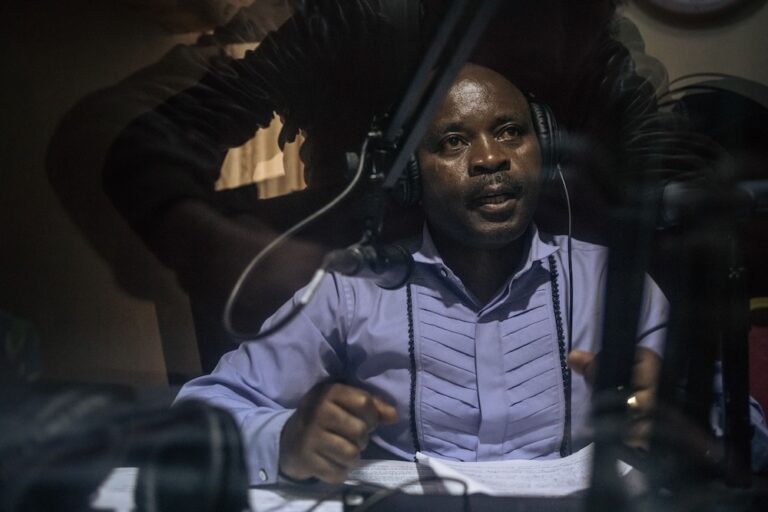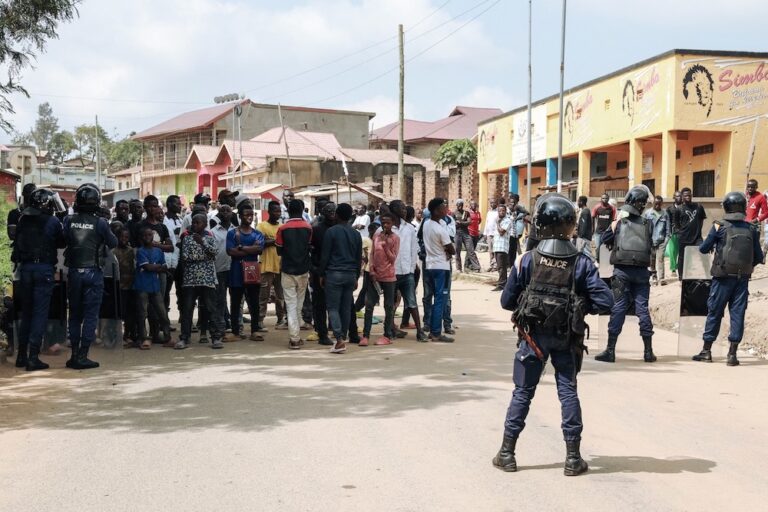(JED/IFEX) – On 19 March 2004, at about 4:00 p.m. (local time), Jean-Denis Lompoto, publication director of the Kinshasa-based satirical bi-weekly “Pili-Pili (“Pepper”), was arrested by seven police inspectors from the Kinshasa/Kalamu High Court Prosecutor’s Office. Lompoto was detained as he was leaving a press conference at Saint Joseph Church, in Kinshasa/Kalamu’s Matonge neighbourhood. The […]
(JED/IFEX) – On 19 March 2004, at about 4:00 p.m. (local time), Jean-Denis Lompoto, publication director of the Kinshasa-based satirical bi-weekly “Pili-Pili (“Pepper”), was arrested by seven police inspectors from the Kinshasa/Kalamu High Court Prosecutor’s Office. Lompoto was detained as he was leaving a press conference at Saint Joseph Church, in Kinshasa/Kalamu’s Matonge neighbourhood.
The police inspectors had a warrant for Lompoto’s arrest, signed by the public prosecutor. The journalist was first taken to the detention centre of the Kinshasa/Kalamu High Court Prosecutor’s Office, where he spent the night. On 20 March, at about 8:00 a.m., he was transferred to the detention centre of the Kinshasa/Gombe High Court Prosecutor’s Office.
JED was able to obtain a copy of the arrest warrant, which lists the charges against Lompoto, aged 35, and two of his colleagues, “Pili-Pili” publisher-editor Prosper Dawe and journalist Angwalima. All three journalists are charged with “defamation and [making] damaging accusations” against Mines Minister Eugène Diomi Ndongala.
The police inspectors assaulted Lompoto and tore his shirt at the time of his arrest. His colleagues Dawe and Angwalima have since gone into hiding.
In its 3 March edition (issue 11), “Pili-Pili” published an article entitled, “Christian-style preying: Diomi Ndongala is undermining the Mining Ministry”. In the article, the paper accused the minister of embezzling US$10,000 each month from the accounts of companies that operate under the Mining Ministry’s authority. “Pili-Pili” also claimed that Diomi Ndongala arranged personnel transfers “so as to place the right thieves in the right positions”, and that his “sharks have siphoned off more than 22 million Congolese francs [approx. US$58,300] in cash and checks”.
In a 20 March discussion with JED, the mining minister’s press secretary told the organisation that Diomi Ndongala was angered by a series of articles that appeared in “Pili-Pili” in which the minister was “unfairly” accused of inappropriate behaviour. “We want the journalist to prove the many allegations he has made against the minister,” the press secretary said.
Lompoto was transferred to Kinshasa’s Penitentiary and Re-education Centre (Centre pénitentiaire et de rééducation de Kinshasa, CPRK, the former Makala Central Prison) on 21 March at 7:00 a.m. Later that same day, a JED representative was able to meet with the journalist in his CPRK cell. Lompoto said his hands were handcuffed behind his back during his transfer to the detention centre, that he did not have a proper hearing as required by law, and that the judge merely asked him if he knew the plaintiff.
Without commenting on the facts of the case and while recognising Diomi Ndongala’s legitimate right to go to court to seek reparation for defamation, JED is nevertheless surprised that any time a plaintiff possesses some political, economic or military power and the accused is a journalist, Congolese judges systematically order the arrest and imprisonment of the journalist, carelessly ignoring the legal principle of “freedom as the rule and incarceration as the exception”.
JED demands that Lompoto be released immediately, given that his arrest and detention were characterised by several irregularities that point to a lack of judicial independence in the country.


